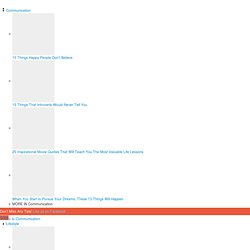

You're Not Losing Your Mind - You're Just Stressed Out! Since this is Brain Awareness Week, ThirdAge decided to have a look at recent research about the aging brain.

We ran across riffs on all the usual advice including diet, exercise, crossword puzzles, "neuroplasticity," and the differences between the gray matter of men and women -- but one finding riveted our attention. If you've been having what seem to be "senior moments" lately, getting older may not be the main culprit after all. Instead, the perpetrator could be constant stress. A study, done at the State University of New York at Buffalo by Zhen Yan, Ph.D., and colleagues and published in the journal "Neuron," showed that when your stress hormone cortisol spikes and then remains high, your prefrontal cortex is disturbed to the point that memory problems can occur. Notice that in both of those examples, the emphasis is on chronic as opposed to acute stress. Don't Just Sit There, Do Something!
Mind Mapping. Neuro Science. Mindfulness meditation: Rewire Your Brain for Better Relationships. The Ten Videos to Change How You View the World. I believe that a sign of good information is that it makes you think.

If reading a book, listening to a lecture or watching a video doesn’t change how you think, it probably isn’t that important. But if you encounter something that forces you to change your views, even if you don’t completely agree with it, you’ve found something valuable. The problem is where do you find these ideas? Better yet, where do you find the time to consume this information?
Recently I found a great place to get started. In this video, Steven Pinker tackles the myth that today is a more violent era than in the past. Pinker believes that a more sensitive reporting system has led us to believe violence has increased, when it has actually dropped. Particle accelerators producing black holes that could destroy the world?
Plus, who doesn’t want to terraform Mars? Statistics generally aren’t described as beautiful, but Hans Rosling comes close in showing the information about our changing world. Studying How Humans Make Decisions. By Marlene Cimons, National Science Foundation You start your car and the "check engine" light comes on. No big deal. It’s not the first time it’s happened, and the auto shop never found anything wrong with it before. So you decide to ignore it. Or: you’re walking down a dark street late at night, and see a shadow behind you. Scientists are very interested in the process you go through while making real-world decisions such as these, because they involve using both "sensory" evidence—you see the engine light come on, or the shadow behind you—and "top-down" signals, that is, information based on prior experience, or knowledge.
"For example, imagine you are on the coast between two points where there are two lighthouses that are sometimes lit and can just be seen from the shore," said Dorion B. "They may be obscured by fog," he continued. Researchers want to better understand how the neural circuits work when people produce these responses, particularly through visual perception.